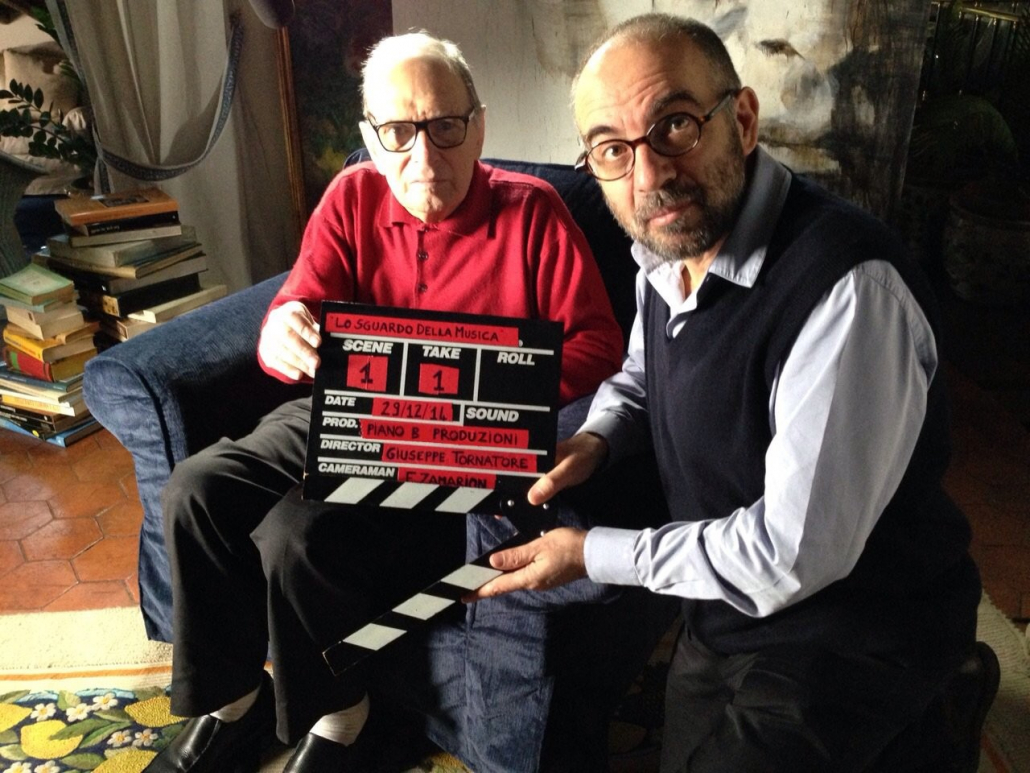
Guiseppe Tornatore’s ENNIO (156 mins., 2021; Music Box) has at last reached the shores of the U.S. after having been released elsewhere around the world over the last couple of years. So what took this terrific documentary so long to find a U.S. distributor? One wonders, since Morricone’s legacy – a list of literally hundreds of movie soundtracks and concert works, plus a massive influence on both Italian and worldwide pop music that came before them – spans decades of popular film scores, some of which transcended the cinematic creations they originally accompanied.
Tornatore, whose own films were adorned by several of Morricone’s richest scores from late in his career (“Cinema Paradiso,” “The Legend of 1900”), spins a predictably structured but anecdote-rich look through Morricone’s life and times here, much of it told by the maestro – who passed away in 2020, before this film was shown – himself. It covers Morricone’s upbringing and family background, plus his uncertain navigation through classical/academic music circles, where he seldom received the recognition of his peers. At RCA in Italy, Morricone found his footing with arranging and conducting hit singles for a variety of pop artists, putting his own unique stamp on tunes that, at the time, ordinarily wouldn’t have been ornamented.
From there come an endless array of classic films and collaborations (many multi-film ones at that) with Sergio Leone and other masters of Italian cinema, including the Taviani brothers and Bernando Bertolucci. Clips from the expected spaghetti westerns, “1900” and “The Sicilian Clan” are included, along with his increasing amount of work scoring international and American films: Terrence Malick’s “Days of Heaven,” Roland Joffe’s “The Mission,” Brian DePalma’s “The Untouchables” and Quentin Tarantino’s “The Hateful Eight” are all on specific display, showcasing the breadth of Morricone’s success across multiple decades and filmmaking eras.
Along the way we hear glowing testimonials and tributes from his co-workers and associates – John Williams, Hans Zimmer, Quincy Jones among those – plus musicians like Bruce Springsteen and Pat Metheny. Some of his filmmaking collaborators are here also: Joffe and Bertolucci most notably, and some more than others (Barry Levinson is a blink-or-you’ll-miss-it appearance, and DePalma is completely absent).
What’s most compelling about this documentary is how Morricone was stung by the lack of respect both from his peers early and, later on, the Academy. This is best summed up in “The Mission”’s inexplicable Oscar loss to “Round Midnight,” a Herbie Hancock “score” mostly comprised of pre-existing jazz standards. Yet, we all know how things went down for some of our favorite composers back in the ‘80s via regrettable decisions like that – something later rectified by Morricone receiving a well-deserved lifetime achievement Oscar (plus what felt like a “make-up” win for “The Hateful Eight” itself).
Tornatore’s documentary is light on personal details and focuses on Morricone’s professionalism and lifetime in music. Many of the stories may have been recounted before, but never from the composer himself in this type of manner. Meanwhile, a few anecdotes do pop up that are fascinating for soundtrack buffs – Morricone explaining how his score for Dino DeLaurentiis’ production of “The Bible” had to be cut short due to label RCA’s contractual protestations; the composer later departing Franco Zefferelli’s “Endless Love” because he refused to work with a Lionel Richie-written title song (Morricone says he later used its discarded theme in his glorious soundtrack for Leone’s “Once Upon a Time in America”).
Lengthy and leisurely but never dull, “Ennio” debuts this week on DVD from Music Box (16:9, 5.1) and later in July on Blu-Ray (2.39, 5.1 DTS MA). Both discs include a subtitled Italian audio track with a Tornatore interview; behind-the-scenes of “Ennio’s Office Concert”; extra scene “The Democracy of Sound”; and the trailer. Highly recommended!
